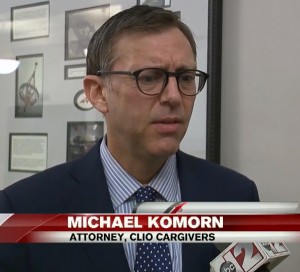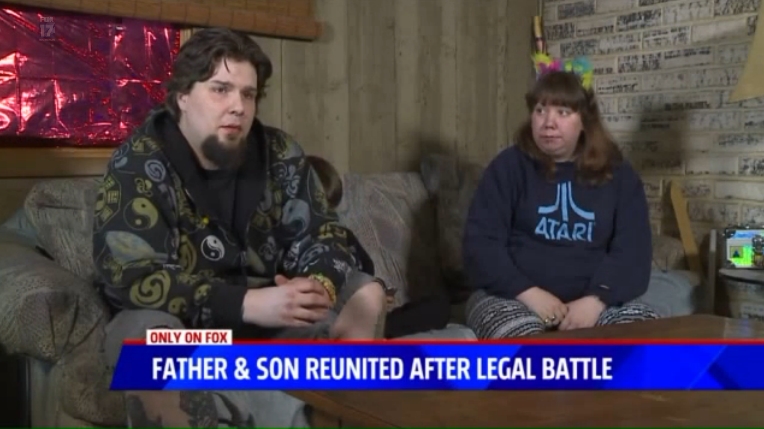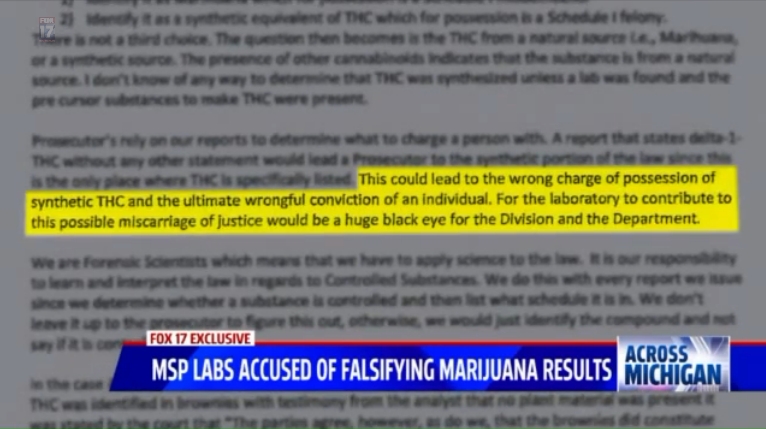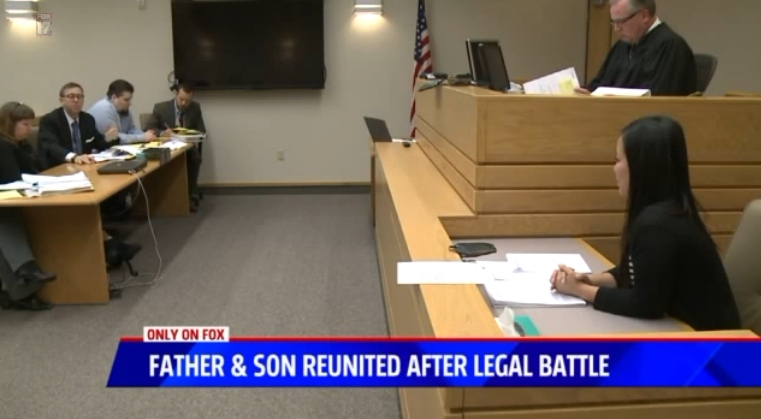
Aug 6, 2016 | Blog, Criminal Defense Attorney Michael Komorn, Marijuana Criminal Defense Attorney Michael Komorn, Michigan Medical Marijuana Act, News
What is the law?
The Michigan legislature has passed into law a one-year pilot program set up in five counties that allows for Michigan State Police to perform roadside drug tests. The way this will work is if a driver gets pulled over for a traffic offense, in one of the five counties that are yet to be determined and shows signs of being under the influence of drugs the specially trained “drug recognition expert” will be able to conduct a field sobriety test. After which, the officer will be able to use the new saliva-based testing to check and see whether the driver has consumed marijuana, heroin, or cocaine.
– Can you say DNA collection?-
What the purpose is?
The officials in charge of pushing through this policy cite the reasoning being that there has been a large increase recently of drugged driving accidents and drugged driving fatalities. The addition of this test to the already used field sobriety testing is intended as means to provide further probable cause to establish the grounds for a lawful arrest.
Additional arrests leads to additional fines and penalties that the police are able to collect from its citizens.
– Can you say More Money?-
What is the science behind this test?
https://www.aaafoundation.org/sites/default/files/EvaluationOfDriversInRelationToPerSeReport.pdf
In a study performed by AAA’s safety foundation, it was determined that it is impossible to set a blood-test threshold for THC. The test states:
There is no evidence from the data collected, particularly from the subjects assessed through the DRE exam, that any objective threshold exists that established impairment, based on THC concentrations measured in specimens collected from cannabis-positive subjects placed under arrest for impaired driving. An association between the presence and degree of indicators of impairment or effect from cannabis use were evident when comparing data from cannabis-positive and cannabis-negative subjects. However, when examining differences in performance in these parameters between subjects with high (>5 2 ng/mL) and low (<5 ng/mL) THC concentrations, minimal differences were found.
Setting any sort of legal limit or per se limit for cannabis and driving are arbitrary and unsupported by science.
Furthermore, in a study done by Forensic Fluids Laboratory the window of time during which a swab test can pick up a THC positive test is up to as long as 3 days. Even though someone may still have THC in their system 3 days after consuming Cannabis, the likelihood that they are still intoxicated is extremely unlikely.
As a result of the probable cause that can be gained from this swab test an officer has the ability to issue an arrest warrant based on evidence that is not providing any scientific proof of the driver current intoxication, but based on its result creates an extremely misleading affidavit.

Jul 29, 2016 | Blog, Criminal Defense Attorney Michael Komorn, Forfeiture, Medical Marijuana Attorney Michael Komorn
Trying to understand why prosecutors in St. Clair County, Michigan, suddenly decided to drop their case against Ginnifer Hency, a medical marijuana patient and caregiver, and return the property that police seized from her home, I obtained several court documents from Shyler Engel, her appellate attorney.
The documents clarify why prosecutors decided to charge her in the first place, why a judge dismissed the charges, and why the prosecutors appealed that decision. But their avowed reason for withdrawing that appeal—a recent ruling by the Michigan Supreme Court interpreting the Michigan Medical Marihuana Act (MMMA)—makes even less sense in light of these details.
Hency was caught up in a raid of the DNA Wellness Center in Kimball Township by the St. Clair County Drug Task Force on July 28, 2014. Police found six ounces of marijuana in her backpack, which was well within the 15-ounce legal limit for her and the five patients she assists.
But a sheriff’s deputy reported that Hency told him she planned to swap the marijuana with another registered caregiver, Dale Shattuck, for the same amount of a different strain that was more suitable for her patients. The alleged plan for a swap that never actually happened was the basis for accusing her of possession with intent to deliver, since the MMMA does not explicity allow caregiver-to-caregiver transfers of marijuana.
On May 18, after four days of hearings, District Judge David Nicholson dismissed the charges against Hency, concluding that any violation of the law was “de minimis”:
There is sufficient evidence to believe that [Hency] intended to deliver the six ounces of marijuana she had in her backpack…in exchange for a like amount to be delivered to her by Dale Shattuck. There is no evidence that would be admissible against Dale Shattuck that he knew of Hency’s intentions or that he participated in any plan to make such a swap. The court is of the opinion that the violation is de minimis. The sequence would be as follows: Two people each have legal possession of six ounces of marijuana. They trade those amounts so that each now possesses six ounces of marijuana, an amount that would be legally held based on caregiver cards each held and the patient cards assigned to each of them. While arguably the act of exchanging the amounts held would constitute a delivery, the court is of the opinion that under these conditions the mutual delivery was not a change in position such as there would be in an exchange of an amount of marijuana for money or any other tangible asset.
On June 19, St. Clair County Senior Assistant Prosecuting Attorney Amy Stover appealed Nicholson’s decision, arguing that it was an “abuse of discretion.” Engel and Michael Komorn, Hency’s trial lawyer, responded on July 7, arguing that Stover was applying the wrong standard of review. Nicholson’s decision should be reversed only if it was “clear error,” they said, and it wasn’t:
The record reflects that [Hency], if she had even made the statement regarding the exchange, was going to exchange the strain of marijuana for a different strain of marijuana for her registered qualifying patients. Accordingly, she was engaged in medical use under the Act, and her actions were protected. Should the MMMA not specifically permit a delivery or transfer to a non registered and qualifying patient, but it was for the benefit of the registered qualifying patients, then that violation of the MMMA is de minimis.
In her August 4 motion to withdraw her office’s appeal, Stover cited the Michigan Supreme Court’s July 27 decision in People v. Hartwick and People v. Tuttle. But it’s not clear how that decision affected the prosecution’s chances of winning its appeal or prevailing at trial. The ruling dealt with three main issues: a patient/caregiver’s right to a pretrial immunity hearing, the impact of prohibited conduct on the legal status of marijuana-related activities that would otherwise be permitted, and the affirmative defense that is available to unregistered as well as registered patients and caregivers. But the court did not change the criteria for immunity, which are spelled out in the MMMA, and it did not address the legality of caregiver-to-caregiver transfers.
Engel summarizes the sequence of events this way:
District Court judge offers cryptic opinion throwing out Hency’s case. Prosecutor appeals.
I write a reply. Prosecutor doesn’t respond to my brief on appeal. Prosecutor dismisses case first court date after my brief is filed. Between the time my reply is filed and the first date on appeal, Michigan Supreme Court publishes Hartwick/Tuttle. Prosecutor says it compels dismissal. No way.
Stover said her office was reassessing about 20 cases in light of Hartwick/Tuttle. If Hency’s case is any indication, the connection between the reassessment and the Michigan Supreme Court’s decision is pretty tenuous. It seems more likely that the negative publicity surrounding profit-driven raids of medical marijuana patients, which has led to serious talk of forfeiture reform in the state legislature, has encouraged local officials to de-escalate their crackdown.
RELATED
Jacob Sullum|7.14.16
Alex Thomas|7.13.16
Jacob Sullum|7.12.16

Jun 30, 2016 | Blog, Criminal Defense Attorney Michael Komorn, Medical Marijuana Attorney Michael Komorn, News
A Southfield lawyer alleges the Michigan State Police crime labs have “falsified lab reports on marijuana statewide” and he’s asking a judge to dismisses charges lodged against a client.
Michael Komorn, who also represents defendants in Livingston County, said his office’s discovery stems from Ottawa County resident Maxwell Lorincz, who was initially charged with a misdemeanor possession of marijuana. The Ottawa County prosecutor’s office increased the charge to a felony when Lorincz declined to plead guilty, Komorn said.
“The extensive emails and documents we received through the Freedom of Information Act show the prosecution are relying on the lab to report these substances so that they can escalate these crimes from misdemeanors to felonies,” the defense attorney said.
Tiffany Brown, a spokeswoman with the state police, said the crime lab’s role is to “determine whether marijuana or THC are present in a sample.
” The department’s policy changed to include the statement “origin unknown,” she noted, “when it is not possible to determine if THC originates from a (marijuana) plant or synthetic means.”
“This change makes it clear that the source of the THC should not be assumed from the lab results,” Brown said in an email response to an inquiry for comment. “The ultimate decision on what to charge an individual with is determined by the prosecutor.”
A message to Karen Miedema, an assistant prosecutor with Ottawa County, was not immediately returned Wednesday.
As a result, Komorn is asking a judge to dismiss the case against Lorincz and to hold the parties, including the prosecutor, in contempt of court. The hearing was scheduled for next week in Ottawa County Circuit Court in Grand Haven; however, it was put on hold until December following a conference between prosecutors, the defense and the judge.
Komorn’s client was first charged with misdemeanor possession of marijuana, but the charge was increased to a felony alleging he had synthetic THC.
The charge resulted when an officer reporting seeing a small amount of hash oil in Lorincz’s Spring Lake home when he responded to his 911 call for medical assistance for his wife in September 2014.
Komorn says the state police’s policy change began in 2013 when Ken Stecker of the Prosecuting Attorneys Association of Michigan and state attorney general’s office “instructed the lab” it could report marijuana edibles and oils as Schedule 1 synthetic THC, which is a felony.
“This was counter to both law and science as plant-based edibles and oils are categorized as marijuana under Michigan law and their possession punished as a misdemeanor,” Komorn said.
Komorn’s office used FOIA to obtain numerous emails regarding the issue. Among those emails was one from Kyle Hoskins, a state police crime lab supervisor who said examiners needed to see plant material because they would have no idea how it was produced unless they watched its production.
He sought Stecker’s opinion, who reportedly responded: “That is my opinion, THC is a Schedule 1 drug regardless of where it comes from. I hope that helps. Ken.”
Marijuana is a Schedule 2 drug under state law.
Among the emails Komorn received were some from state police crime lab workers raising concern about the way they were told to report THC cases.
In one email, a forensic scientist notes that to “place the actual compound THC in Schedule 1 (drugs), the criteria of ‘synthetic equivalent’ should be met.”
“Since we really can’t do this, there are many of us who feel that these new evidentiary materials containing THC without any botanical morphology characteristics … should be identified as resinous extracts of marijuana,” the forensic scientist wrote.
The writer goes on to note that misdemeanors can jump to a felony charge and the topic is being brought up “because there seemed to be some concern about uniformity in making these calls. Further, it is highly doubtful that any of these (medical marijuana) products we are seeing have THC that was synthesized.”
Komorn’s office said the “statewide lab scandal” comes on the heels of a report that statewide marijuana arrests are on the rise.
Between 2008 — when Michigan passed the Medical Marijuana Act — and 2014, arrests for marijuana possession or use increased 17 percent statewide while arrests for all crimes dropped by 15 percent, according to statistics.
Charmie Gholson, founder of Michigan Moms United, said Komorn’s case clearly shows that Michigan’s top prosecutors and law enforcers “conspired to commit crimes against Michigan families.”
“There’s a strategy,” she said. “Someone at the top has sent these soldiers to people’s homes. … This proves the top law enforcement has conspired to target families.”
Lorincz Daubert Exhibits
Contact Livingston Daily justice reporter Lisa Roose-Church at 517-552-2846 or lrchurch@gannett.com. Follow her on Twitter @LisaRooseChurch.
November 4, 2015

Apr 27, 2016 | Criminal Defense Attorney Michael Komorn, News
CLIO (WJRT) – (04/25/16) – A Mid-Michigan marihuana dispensary is fighting the Genesee County Prosecutor’s office in court after FANG shut them down.
The owner of the Clio dispensary says warrants weren’t valid and he wants his business back open.
Attorneys from both sides were in Judge Hayman’s court Monday afternoon. The raid happened in January when the Genesee County Prosecutor’s office filed an emergency injunction to close down a facility called Clio Caregiver Connection.
A counter claim was filed against the Prosecutor’s Office, saying the county failed to meet legal requirements to participate with FANG.
The defense also argues that the recent dispensary raids and padlocking efforts by FANG were and are illegal.
“I don’t write the laws. I just enforce them. Dispensaries are not allowed. The word dispensary does not even appear in the medical marihuana act,” said Prosecuting Attorney David Leyton.
“There’s never been any complaints from anyone. He’s loved by all of the patients that’ve gone in there. They’re all unhappy that this was forced down. And it’s just an overreach by FANG,” said Clio Caregiver Connection Attorney Michael Komorn.

The case is in its early stages. Both sides will return to court to discuss it again on May 16.
By: Caresse Jackman – Updated: Tue 1:27 PM, Apr 26, 2016
Watch the Report

Apr 8, 2016 | Blog, Criminal Defense Attorney Michael Komorn, Medical Marijuana Attorney Michael Komorn, News, Victories Project
SPRING LAKE, Mich. — After 18 months, a Spring Lake family’s son is out of foster care and reunited with his parents. Yet the fight to be together, through court battles and serious drug charges despite being card-carrying medical marijuana patients, still haunts them.

Thursday, Max Lorincz’s son Dante, 6, picked out his favorite toys from a basket in the family’s living room, handing one to FOX 17 saying, “this is my dad’s favorite.”
Piece by piece, Max and his family are putting their lives back together.

“It’s like 100 pounds being lifted off my chest,” Lorincz said. “It’s like our entire life was put on hold the entire time he was gone.”
Dante was ripped away from the couple after Max was charged with a felony for possession of “synthetic THC.” Between family and criminal court cases, it’s an experience they call hellish.
“It’s not something I’d wish on my worst enemy, the experience we went through,” Lorincz said.
“[Dante] is 6 now, almost 7, you know he’s his own little person at this point. But before, he was just coming into his own, and we missed that entire portion of his life.”
It is a bizarre case FOX 17 first uncovered: the judge handling the criminal case ultimately threw out the charge 16 months later.
September 2014 it all started when police found a thumbprint of hash oil at Lorincz’s home during an unrelated medical emergency. That lead to a felony charge for a charge the judge later ruled unfounded: possession of “synthetic THC.”

A previous, now controversial Michigan State Police policy change in the state’s crime labs requires forensic scientists to write “origin unknown” when testing marijuana without plant matter visible.
Fast-forward 16 months, a judge drops Lorincz’s felony. But the court battles continued in family court for Lorincz and his wife to regain custody of Dante for another two months against Bethany Christian Services.
Only FOX 17 cameras were in court for several permanency planning review hearings including last November during this exchange between Lorincz’s Attorney Michael Komorn and the Bethany Christian Services caseworker:

“What is it, other than [Lorincz’s] use of marijuana, that creates bad parenting?” asked Komorn of the caseworker.
She testified, “Marijuana is a psychoactive substance, and being under the influence doesn’t allow you to be in the most clear mind for your child.”
This woman was the third of five total caseworkers now in the 18-month family court case representing Bethany Christian Services. The agency threatened to petition for permanent removal of Dante from his parents.
In this November hearing, the judge already allowed Lorincz, a legal card holder, to continue use of medical marijuana. The caseworker here on the stand testified that marijuana, even legally used for medical conditions, may make an unfit parent. This was a sticking point in many of these permanency planning review hearings, but ultimately she testified BCS had no evidence to prove drug abuse.
Komorn continued to ask her, “One of the reasons for you to recommend the permanent removal is because of drug substance issues, am I right?”
To which the caseworker said, “Yes.” Komorn continued with, “Ok, and we’ve already clarified that there are no drug substance issues at all regarding my client [Lorincz], am I right?”
She testified, “Yes, yes.”
Now, weeks later, another slap in the face for the Lorincz family: a billboard popping up several blocks from their home on 144th Avenue, with the face of Attorney Chris Wirth, who advocated for their son, working against them in their custody fight.

Lorincz and his family are moving on, but he continues to call for clarified medical marijuana patient rights in Michigan, for the medicine he says saved his life.
“2009 when he [Dante] was being born, he was born in Butterworth Hospital, I was dying of liver failure in Blodgett Hospital across town. It was due to my doctor prescribing too much medication,” Lorincz said.
And the 18 months Lorincz spent legally removed from his son, he reminded, they will never get back.
“We’ll try and make as many positive memories as we can to make up the gap,” Lorincz said. “But there’s definitely nothing that’ll replace the time that we lost, that’s for sure.”
The Lorincz’s have started this GoFundMe page, asking for any help to cover their expenses at this time.

Mar 28, 2016 | Blog, Criminal Defense Attorney Michael Komorn, Michigan Medical Marijuana Criminal Defense Attorney Michael Komorn
“This is one of those cases in an attorney’s career that is not easily forgotten, and is a reminder to me of the reason I became an attorney.”
– Michael Komorn, attorney from Komorn Law and recipient of the Michigan Bar Association Right to Counsel Award for 2015.
SPRING LAKE- Max Lorincz and his wife will have custody of their six-year old son returned to them by court order in a Michigan case that made national headlines over a dispute with the State Police Crime Lab over marijuana testing.
Dante, the Lorincz’s son, was removed from his Spring Lake home after investigators charged Max with possession of synthetic marijuana- a felony in Michigan. Lorincz is a registered medical marijuana patient and has always claimed that the substance found by police during a search of his home- a “smear” of substance, so small it’s weight could not be quantified- was medicinal and derived from a natural plant source.
The case began not from an investigation into Lorincz, but with a 911 call from Max to get medical help for a family emergency not related to marijuana. While assisting with the emergency, police accidentally discovered the smear of suspicious substance and began criminal proceedings.
SUPPORT THE LORINCZ FAMILY: VISIT THEIR GOFUNDME PAGE AT https://www.gofundme.com/SVQ5W5W
In building a case, attorney Michael Komorn and investigators from his office probed the Crime Lab on the policies and procedures that lead to the determination of synthetic marijuana in this case. They discovered a hotbed of controversy, including prosecutors coaching scientists to produce results that favored the prosecution in court cases. Emails from representatives of the Prosecuting Attorneys Association of Michigan to heads of the Lab were revealed, as were protests from scientists forced to change how they report their science for political advantage- changes that brought dire criminal consequences for the citizens whose samples were being evaluated.
“The lab technician in Lorincz’s case testified that he has been testing tetrahydrocannabinol, or THC, for 25 years. THC is the main psychoactive ingredient in marijuana, also present in synthetics. However, a recent policy change means the technicians have to write “origin unknown” when testing this type of THC on lab reports,” reported Fox News in 2015.
The change in reporting was directly derived from the prosecutor-initiated procedures- and that was enough information to put doubt in the mind of the judge. The lab was not proving the substance was synthetic, they were inferring it, and that does not meet the standard of evidence for courtroom procedures.
Based in a large part on these revelations about evidence handling, Komorn Law secured a dismissal of felony charges in the Lorincz case on January 22. “The judge got it right: the law is very clear on this, and any prosecutor that proceeds under a theory (of synthetic THC), as this office did here, is flat-out wrong,” Komorn told Fox News at the time. “(Prosecutors) should be stopped from doing that… all defense lawyers should know that it’s an inappropriate charge.”
“The wheels of justice grind slowly but exceedingly fine,” said Jeff Frazier of Komorn Law, one of the people directly responsible for exposing the inappropriate influence used by prosecutors in the Crime Lab scientific method.
After the charge was dismissed Komorn Law fought to reunite the family. “Getting Max’s son back was the last and most difficult piece of the puzzle,” Komorn told The Compassion Chronicles. “To me the CPS case reflects an equally broken and corrupt agency within our government.”
Bethany Christian Services (BCS), who has been paid by the state’s Child Protective Services (CPS) to take over the foster care of the young Lorincx child, contested the boy’s return, saying the case had been going on for so long the familial bond had been broken and it was in Dante’s best interest to remain under their guidance.
“Even after we eradicated the allegations of the removal, and dispelled the myth that Max’s status as a medical marijuana patient was not evidence of harm to the child, the agency, prosecutor and guardian ad litem seemingly dug in deeper.”
Once the criminal charges were no longer justification for the continued removal of Dante from the Lorincz home, BCS made other ridiculous claims to explain why the child could not be returned to his parents: he plays lots of video games, his family is poor and his mother is ill.
Court hearings revealed that the behavior shown by Bethany Christian Services, including asking the child himself to choose between his parents and other living options, were contradictory to state procedure regarding foster care. BCS was removed as supervising agency of the Lorincx child by court order, which opened the door to having him returned home.
“It seemed as if every time we made some progress, the agency, the prosecutor came up with some other, unrelated complaint or reason to oppose reunification. We were fortunate that the Court agreed with us, and determined the ( say anything to win) allegations of being poor, his wife’s mental illness, and playing video games are not grounds for removal,” said Komorn.
Bernard Jocuns is a criminal defense attorney from Lapeer has been following the case. “It angers me that professionals that the public are supposed to trust are responsible for this miscarriage of justice. The Michigan Court Rules and Rules of Evidence are in place to provide parity to prosecution and defense (attorneys).”
“It is scary to think what would be happening to Max now, had he not caught the ear of a prominent criminal defense attorney who was willing to take his case pro-bono ,” said Jamie Lowell, a Board member of the MILegalize organization.
The decision was delivered on March 25; it could take several days before Max’s son is returned home to him.
“Yesterday’s ruling ended the 17 month nightmare for the Lorincz family, but it does not end this matter,” Komorn said today. “Komorn Law intends to pursue and exercise every single possible legal recourse available to us, to make this family whole again.”
A listing of Komorn Law Blog updates on the case can be found at:
komornlaw.com/press/komorn-in-the-news/people-v-max-lorincz/












